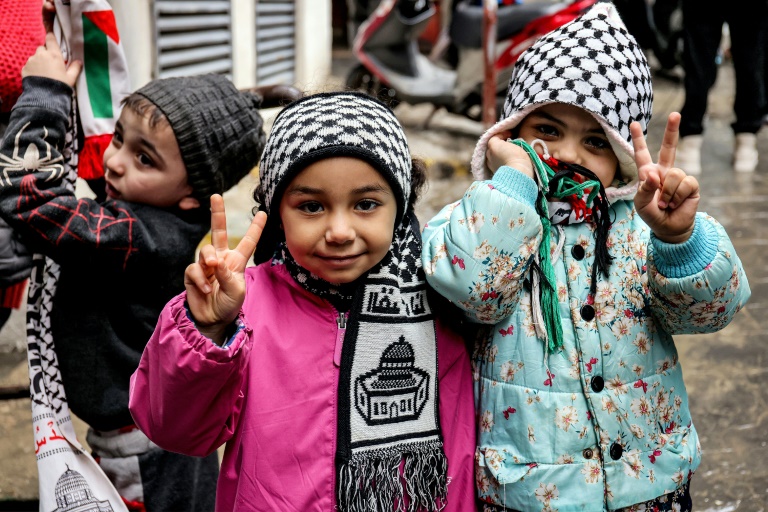Palestinian refugees in Lebanon despair at UN agency funding cuts

Children wearing Palestinian keffiyeh scarves gesture as they stand along an alley in the Burj al-Barajneh camp for Palestinian refugees in southern Beirut
Beirut – Fakhria al-Ali depends on the United Nations agency for Palestinian refugees for her breast cancer treatment in Lebanon, but after key countries suspended their financing, she fears she has been handed a death sentence.
“My life is a nightmare,” said the unemployed 50-year-old, who lives in the impoverished Beddawi Palestinian refugee camp in north Lebanon.
“Without UNRWA I would die,” she added, referring to the UN agency for Palestinian refugees.
UNRWA was set up in 1949 and assists Palestinians who fled or were forced from their homes by the war over Israel’s creation a year earlier, as well as their descendants.
The agency is under fire over Israeli accusations that 12 staff members were involved in Hamas’s October 7 attack on Israel.
More than a dozen countries including the United States and Britain have suspended funding to the agency, which sacked the accused individuals.
Some 5.9 million Palestinians are registered with UNRWA in Jordan, Lebanon, Syria, the Gaza Strip and the West Bank, including east Jerusalem, and can access assistance such as health care and social services.
Lebanon hosts an estimated 250,000 Palestinian refugees, according to UNRWA.
“An entire people will face death — those with cancer like me first of all,” Ali told AFP by telephone.
– ‘Killing us slowly’ –
Dorothee Klaus, the agency’s director in Lebanon, warned of “severe consequences for UNRWA operations” and Palestinian refugees if the countries fail to reverse their decisions “before the agency runs out of funding at the end of March”.
“An estimated 80 percent” of Lebanon’s Palestinian refugee community needs UNRWA help, from schooling to cash assistance, she added, noting the number was “constantly increasing” amid a four-year-long economic crisis in Lebanon that has plunged most of the population into poverty.
UNRWA has a cost-sharing agreement for some 50,000 Palestinian refugee hospital patients in Lebanon, and takes care of “around 600 cancer patients”, Klaus said.
Without the agency’s help, “patients would have to forego critical hospital treatment”, she warned.
For some 23,000 Palestinian refugees who have come to Lebanon fleeing civil war in neighbouring Syria, the situation is just as desperate.
“They are killing us slowly… this decision simply aims to erase our existence as a people,” said Najah al-Daher, a housewife who came to Lebanon with her family in 2019.
“If the aid is cut, how will I live, how will I educate my children?” said Daher, whose husband does odd jobs to make ends meet.
“Collecting rubbish, is that (my son’s) future?”
UNRWA educates thousands of Palestinian students in more than 60 schools across Lebanon, Klaus said.
Without funding, “we would see 40,000 children out of school, on the streets, with no place to go,” she warned.
Education can be a vital gateway for Palestinian youth, sometimes helping them secure work abroad, as Lebanon places restrictions on their employment.
– ‘Give our land back’ –
Daher and her sister Majida, 32, each receive around $300 in aid per month from UNRWA to help support their families.
Majida and her husband are in debt, and live with their two children in the ramshackle Palestinian refugee camp of Burj al-Barajneh, in Beirut’s southern suburbs, where they rent a room for $60 a month.
“The rent risks going up, and if they also cut our UNRWA aid, we’ll be out on the streets,” Majida al-Daher said, decrying what she called the “collective punishment” of Palestinian refugees.
Some 80 percent of Palestinian refugees in Lebanon live in poverty, according to UNRWA.
Haitham al-Jashi, who works in a minimarket in the camp, said “options are limited for us, and it’s been worse since the (economic) crisis” in Lebanon.
The countries’ decision to suspend funding is an “attempt to tighten the noose around Palestinians”, he said, adding that he was already struggled to make a living.
Palestinian Youssef Dahuk, 40, who does odd jobs to try to make ends meet in the camp, said his four children were all totally dependent on UNRWA assistance.
“It’s as if our lives are coming to an end,” he said.
“I’d be OK if they cut off our aid — but in that case, give us our land back,” he said.
